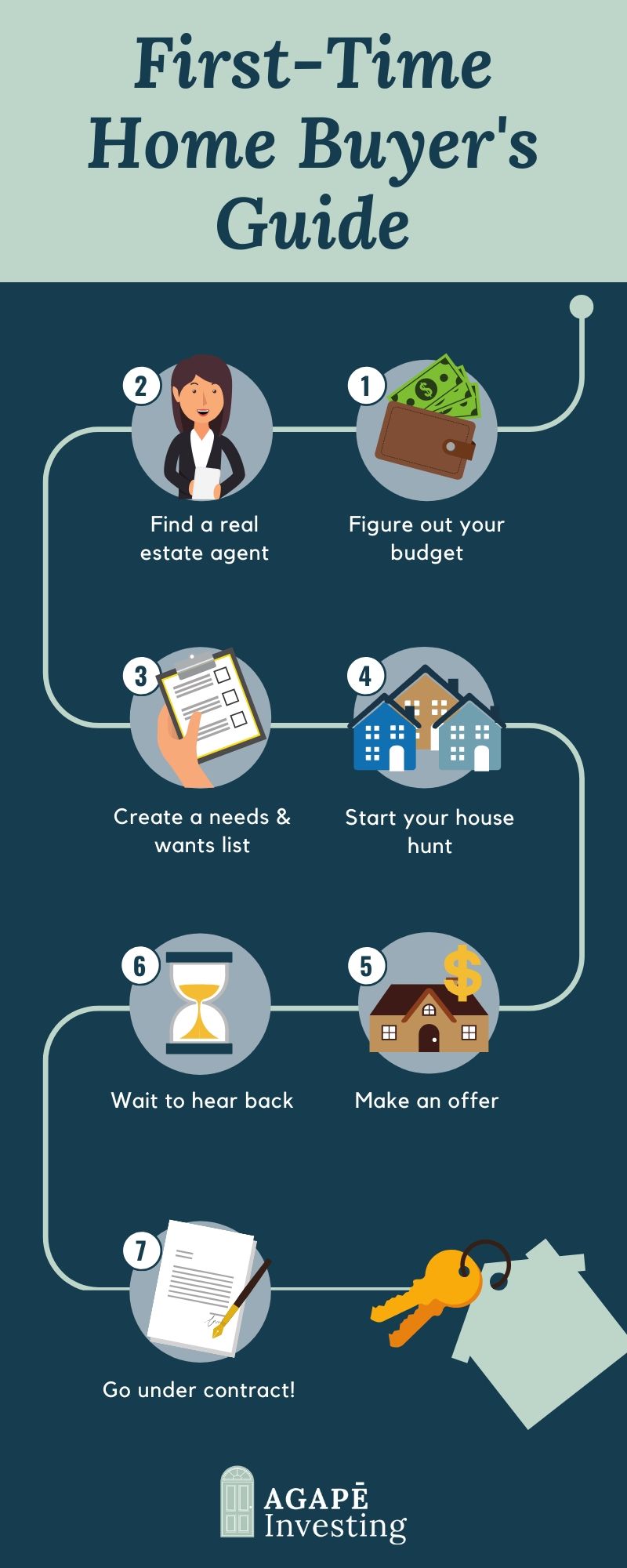First Time Home Buyer’s Guide
Are you considering buying your first home? A home is a fantastic way to build wealth, because real estate is a wildly appreciating asset.
Buying a home is such an exciting time, but for first time home buyers, it can be a lot to take in. This First Time Home Buyer’s Guide is here to help you navigate the process of buying a house.
I have worked in property management, have purchased two rental properties, recently worked as a Redfin as an associate agent for 2 years, and now currently help other agents in the Denver Metro area get their clients into homes quicker. All this to say, I know a few things about real estate, and want to help you understand the buying process a bit more so you can confidently make your first home purchase!
SCHEDULE A FREE HOME BUYER CONSULTATION
(Available in the US only)

When Should You Buy a House?
There are a few things to consider before buying your first house:
- What the price-to-rent ratio is
- How long you plan on living in a house
- How much you have to put down on the property
- What your mortgage payments will be
- Whether or not you have an emergency fund
Thinking through these points will help you to determine if you are ready to buy your first house, or if you should potentially keep renting.
If you are ready to buy your first house, spring & summer are the most popular times to buy and sell real estate. There are many factors that determine this; the weather is nicer which makes viewing homes and moving into them easier, and kids aren’t in school which makes planning a move less stressful.
The fall and winter are still great times to buy a house though. There is less competition and easier access to professionals who are typically very busy in the summer. So if anyone ever says that you can’t buy a house in the cooler months of the year, know that that is just a home buying myth.
Steps To Buying Your First House
*Disclaimer: This is a very general home buyer’s guide. Every state may have a slightly different process and each professional you talk with will have a slightly different way of approaching it. We recommend that you talk with the professionals in your area to get the best “full picture”*
1) Figure Out Your Budget
The first step in buying a home includes finding a lender. It is recommended to shop around to see what kinds of mortgages are available and what kind of rates you can get. The lower the interest rate the better. But be careful of adjustable-rate mortgages because even though they boast lower interest rates to begin, they can adjust and go up over time.
Typically, homebuyers fund the purchase of a house by getting a mortgage. When it comes to mortgages there are dozens of different types.
Most Common Mortgages
- Conventional mortgages
- Government-insured mortgages (FHA, VA, or USDA)
- Adjustable-rate mortgages (ARM).
Be sure to discuss your options with a lender to determine the best one for you and your situation.
Related: Guide to Creating A Household Budget
How Much Do I Need to Save to Buy a House?
To determine how much money you need to save in order to buy a house be sure to talk with your lender in advance. How much you are able to put as a down payment on a house will have an effect on your house budget.
Some mortgages, like the FHA loan, allow you to put as little as 3.5% of the purchase price down.
If you are able to put down 20% of the purchase price of a home, you will be able to avoid private mortgage insurance (PMI), which would be an added monthly expense to your mortgage payments. Even though it says “insurance” it is not designed to protect you. Rather it protects the lender because you are considered a “high-risk” borrower. I’d recommend trying to avoid PMI if you can.
However, the down payment is not the only expense you will run into during your home buying process.
What Expenses Go Into Buying a House?
A common misconception is that the only major expense you incur when buying a home is the down payment. While the down payment is typically the largest ticket item, there are actually quite a few other big expenses that go along with buying a home.
- Earnest money
- Down payment
- Closing costs
- Inspection fee
- Appraisal fee
- Prorated property taxes
- Prorated utilities
- Prorated HOA dues
- Insurance

How Do I Apply for a Mortgage?
To get one of these loans, you will need to meet with a lender or mortgage broker who will have you fill out an application.
The lender will ask you questions about your job, income, debts, credit score, and savings. They will also do a credit check to help determine the interest rate you can qualify for.
You will need to determine how much you are able and willing to pay as a down payment. As well as determine how much you are able and willing to pay as a monthly mortgage payment.
Once they put all of this together they will pre-approve you for a loan and give you a maximum purchase price. The lender will give you a pre-approval letter which in some states is required in order to put an offer in on a home.
~ Fun Fact: Typically, the higher the down payment the lower the interest rate will be. Also, if you put down less than 20% of the purchase price you will need to pay PMI
Related: How Coffee Affects Home Prices
2) Find a Real Estate Agent
When looking for a home, it is best to use a licensed real estate agent to help you through the process. If you found one before you found a lender that is great. Typically, if you find a real estate agent first, they can recommend you to some lenders they have worked within the past.
The real estate agent you choose to represent you in this process is considered your buyer’s agent. They have a fiduciary responsibility to you, which means that they need to keep your best interests in mind when it comes to how you spend your money.
Need help finding an amazing real estate agent in your area to help you find your future home? Let’s jump on a free home buyer consultation call and I would be more than happy to help you locate one totally for free!

Related: Finding an Investor-Experienced Real Estate Agent
How Do I Find a Good Real Estate Agent?
To find a good agent I would recommend getting referrals from those you trust. If your best friend recently bought a house, find out who they used and ask them how the process went with that agent.
Buyer’s agents have a fiduciary responsibility to their clients, so they should be looking out for your best interests through the process, but it is very important that you work with someone you feel comfortable with and that you trust will take good care of you.
In most states, the seller pays the agents commissions in a home sale, so working with a great real estate agent won’t cost you a thing.
~ Fun Fact: Not all real estate agents are REALTORS. Agents need to take extra courses and are held to higher ethical standards in order to become a member of the NATIONAL ASSOCIATION OF REALTOR. Ask your real estate agent if they are a REALTOR.

3) Create a Needs/Wants List
It is important to make sure you and whomever you are house hunting with are on the same page when it comes to what you want in a home. Make it clear to yourself, your family, as well as your agent what things you are willing to compromise on versus the things that are deal-breakers.
Learning and understanding your market can be very beneficial to the home buying process. Decide where you want to live and how that decision affects the home prices.
Related: 5 Ways You Can Start Learning Your Market
Think about what you want to accomplish with homeownership. Do you want a great space to entertain people or are you looking forward to a peaceful getaway after your long days? Maybe you have dogs so you want more space inside and out for them to run around! Whatever it is, write it down.
Then decide what things are must-haves in your new home. If you cannot live without a 2-car garage, don’t look at homes with a single car garage! But maybe you are okay with dropping your desire to a master suite with a jacuzzi tub in it.
Everyone’s needs and wants are going to be different. Don’t let anyone else persuade you that you need to have a master chef kitchen if you really hate cooking.
4) Start Your House Hunt!
Typically, this is the most exciting part of the process! It can be a lot of fun going to check out houses that could potentially become your HOME! However, it can also be a very stressful, and tiresome process.
Your agent will most likely get you set up on a search through the local MLS that will send you houses via email that meet the criteria that you gave them. You can look at the photos and read through the information on each place and then decide if you’d like to go check it out or not.

~ Fun Fact: Most listing agents will post properties on the MLS on Thursday or Friday, just in time for plenty of people to go check them out over the weekend. So make sure to be watching for new listings on those days!
When you find some houses that you want to go view, let your agent know and they will set up the showing for you. You will go with your agent (or in some cases one of their associates) to view the house.
Take note of the things you do and don’t like about the house to help you to refine your search. Be honest with your feedback on the home. If you really are not fond of the layout you won’t hurt your agent’s feelings by telling them that.
5) Make an Offer
You have checked out a lot of houses, and finally, you found one that you can picture becoming a long term home for you and your family. It is time to make an offer!
Your real estate agent will coach you through the process of putting in an offer on a home. Each market is different so the strategy to your offer will differ from other markets.
A lot of people are moving to Denver and the market is very hot. It is what they call a seller’s market. This means that the sellers right now have more power when it comes to negotiating. There are a lot of people looking to buy a house, and not a lot of houses are on the market! So a lot of people will have their eyes on the same houses that you do. Because of this, people offer more money than the asking price so that theirs will hopefully get chosen.
Make a plan with your buyer’s agent. Your agent will help guide you when putting in an offer on a house. They can try to get some useful information from the listing agent that might help create a stronger offer.
6. Wait to Hear Back
After you have submitted an offer on the property you need to hang tight until you hear back from the seller. If they received multiple offers, they will look them over and choose the one that the like best. Sometimes this comes down to the offer price, contingencies, or other terms.
Your offer will have a response deadline on it which is the date and time in which you request to hear back from the seller.
You will likely get one of three responses, (1) they have accepted another offer (2) they counter offered yours or (3) they accepted your offer!
What If My Offer is Not Accepted?
Typically, if the seller has accepted another offer there is nothing you can do but move on. If the contract falls through your buyer’s agent will likely be notified and you can decide if you want to pursue the property again.
If they counter offered on your bid you can decide to accept that counteroffer or you can counteroffer back.
Usually, the response you are hoping for is an acceptance to your offer. This means they chose you to purchase the home and you are now under contract! Your closing date will most likely be 30 days out from then, but until then there is still a lot to do!
7. The Closing Process
An accepted offer does not mean that you have purchased the home yet. After your offer is accepted, you will start on the closing process.

Check out our guide on The Closing Process. Everything you need to know in order to smoothly close on your house.
Getting Ready to Move?
10 Thinks You Need to do BEFORE Moving Into Your New House
Have you heard about House Hacking?? This could be a great option for you if you are are on the journey towards financial independence.
Download our Preventative Home Maintenance Checklist here so you can keep your house in great shape for many years.
You May Also Like
The Ultimate Preventative Home Maintenance Checklist
6 Common Home Buying Myths
10 Things to do Before Moving Into a New House
Emergency Fund – What it is and Why You Need One




Informative post. Thanks for sharing this info, it’s really useful.